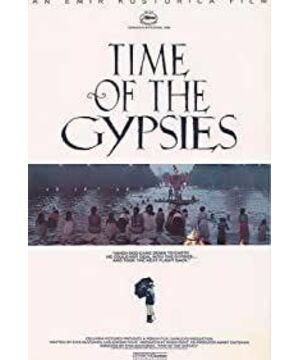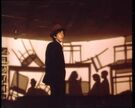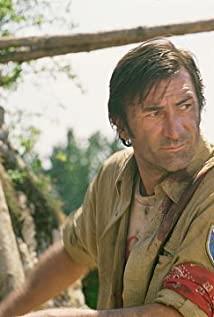Through the fate and family history of a poor and suffering Cigang people, the shocking facts of abducting and trafficking Zigang children and instigating them to commit crimes are revealed. After the film was released simultaneously in major cities in Yugoslavia in early 1989, it was almost sold out and received unprecedented popularity among the audience. It was awarded the Best Director Award at the 1989 Cannes Film Festival, and was listed as one of the ten best films of the 80s by the French magazine Cinéma du Cinéma and Radio 2 Europe, and was also listed in the Paris Monthly Premiere in Top of the list of the 30 best films of 1989. After it was released in major cities in the United States at the same time, it was also well received by the film industry and the audience. It is one of the few Eastern European countries that has been favored in the United States after "Dad Goes on Business" directed by Kusdurica several years ago. one of the videos.
Kusdurica has several innovations in the film's narrative approach. It is similar to magical realism in Latin American literature, but in a very different way. From the beginning of the film to the first segment where Perhan proposed marriage and was kicked out of the house by Azra's mother, the camera revolves around the environment and the relationships of the people living in the Cigan, showing all aspects of their lives in a slow rhythm: the rusty and mottled The tin roof, the tattered car, the standing telephone pole, the littering household utensils, the stumbling white geese, the melancholy girl who dresses up, the kind old man and the vicious scoundrel, etc. The camera lens pushes, pulls and pans briskly, but it brings an unbearable and desperate intuitive feeling to the audience. Most of the Cigang people living there are lazy, just living by and not aggressive. The boundaries between right and wrong are blurred, and their actions are inclusive of good and evil, and there is evil in good and good in evil. The difference between pure love and instinctual sexual desire is sometimes clear in their minds, and sometimes confused. There is endless teasing, entanglement and bullying. Their relationship between individuals and groups seems to be harmonious and close, but they appear numb and indifferent, and they treat people like those geese walking around. The initial impression left by the film to the audience is that everything in this settlement is simply a large livestock farm placed by God. The audience can't help but frown and wonder, what is the director trying to explain to us?
The dramatic conflict unfolds from Perhan to Italy where he is forced to engage in theft. He fell into the clutches of the kidnappers and was thrown into the deep valley of darkness, but his conscience is still alive, and although he has become a "master", he still cannot forget the carefree little world of the Cigan people who raised him. He missed his grandmother and sister, especially Azra. Helpless, one after another, unexpected encounters made his hopes dashed. After that, although he got married and found his sister and son, this was not so much his happiness and joy, but a heavier blow to him. After going through the complicated world affairs, he gradually matured, and the boundaries between right and wrong became clearer in his mind.
From Perhan's killing of the kidnapper Ahmed to the end of the film, the audience is overwhelmed by the rapidly changing plot developments. Although Perhan took his revenge, he also paid the price with his own life. His son took two gold coins from his eyes and went back to Rome. It is not difficult for the audience to realize that his son will continue on his previous path, repeating his mistakes. As for when he can get rid of the fetters imposed on him by the sinful society, it remains to be his awakening.
The Cigan people, also known as Gypsies, roam all over the world. They have been at the lowest level of society for generations. They maintain ancient living habits. Compared with the social civilization of advanced nations, they are undeniably backward and ignorant. However, their backwardness and ignorance show a natural and pure beauty compared to the various evils of the black organizations that are common in the civilized society of advanced nations.
In films around the world, films that reflect the living conditions of the Zagan (Gypsies) appear from time to time. The French film "Notre Dame de Paris" and the Mexican film "Yesenia" based on Hugo's novel are even more popular and are well received by audiences across the country. The difference between this film and other films is that it does not focus on exaggerating the lingering love between the people of Cigang and other races, but shows the harsh life of the people of Cigang. To this end, the director boldly hired several ordinary Izgan people to play the main roles. The actor who plays the protagonist, Davor Dujmovic, is an unemployed young man who is about to become a father. He lives with his grandmother in a simple chalet of 5 to 6 square meters. His own life experience is almost exactly the same as Perhan's fate in the film. Before the filming, he was also locked in a children's correctional center. The director took a fancy to him and tried to get him out. Because of his life experience, he played Perhan so vividly that he won the Best Young European Actor Award. The actor who plays the grandmother is also an ordinary working woman in Cigan. She portrays the mentality of an upright, kind, industrious, enthusiastic and troubled old woman in Cigan in a meticulous detail, which is sympathetic and sad.
The photography of this film is impeccable. It is contrary to the usual structural principles of the film picture, and tends to pursue a beauty of natural imperfections, making it intertwined with the theme of the film.
Director Kusdurika was born in Sarajevo in 1954. He graduated from the Directing Department of the Prague Film Academy in 1977. He first directed several TV films in Sarajevo TV, showing his talent. In 1980, he began directing the feature film "Do You Remember Pretty Dolly Bell? " became famous in one fell swoop, winning the 1981 Venice International Film Festival Award and a number of domestic film festival awards. Set in Sarajevo in the 1960s, the film reveals the contradiction between traditional beliefs and contemporary Western influences in a fresh and smooth style. In 1984, he directed the second film "Dad on a Business Trip", which further made him famous in the world film circle. In addition to winning the Palme d'Or at the Cannes International Film Festival in 1985, this film also won the American Golden Globe Award for Best Foreign Language Film in the same year. , and was nominated for the 1986 American Academy Award for Best Foreign Language Film, and won many awards at domestic film festivals. It was filmed in Yugoslavia in a specific era of political changes, and it was a serious political reflection on the past by the Yugoslav people in the face of the future. When dealing with such a heavy, serious subject, he did not go into dry sermons, but adopted a form of humor that people liked and heard, which is evident from the witty title: Dad was actually on a "business trip" to the concentration camp. went.
It is no accident that Kusdurika's three consecutive films have received deep attention and praise from the international film community. He has always paid attention to major social issues in Yugoslavia both domestically and internationally, and has spoken out with the political courage and artistic conscience of an honest artist, trying to get a deafening effect. Although the current Yugoslav Federation has been disintegrated and divided into many countries, he has a place in the history of world cinema as the leader of the "New Wave" movement of the former Yugoslav films.
View more about Time of the Gypsies reviews










